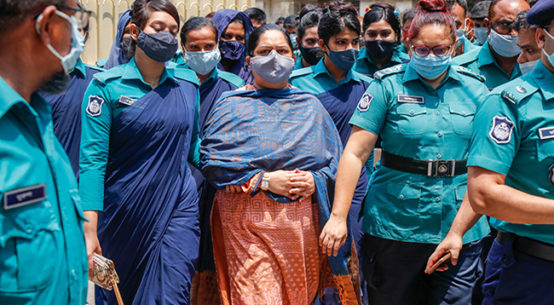The unprecedented effects of Covid-19 have shaken worldwide the economies and supply chains. Bangladesh, along with other textile-garment producing nations, faced supply chain disruptions, factory closures, order cancellations, or suspensions and export losses. Bangladesh as one of the major players in the garments sector has been severely affected by the prolonged pandemic.
2020’s apparel industry at a glance
Primarily, the supply of raw materials to local garment factories was disrupted when China -Bangladesh’s main source for raw materials – paused all shipments between March and April due to the coronavirus outbreak.
Though, garment factories were allowed to continue operations if they had enough work orders from global buyers or if they wanted to produce Personal Protective Equipment (PPE).
But the sector met great trouble when several international buyers offered lower prices and deferred their payments at a time when restrictions on movement caused delays in shipment. These factors led to job losses for many workers as the millers were forced to close their factories following a drastic fall in production.
According to BGMEA, exporters received 30 percent fewer work orders for the December-March season compared to the pre-pandemic levels.
On the other hand, backward linkages – to whom the apparel sector is highly dependent has also come under tremendous financial losses. As some of the Readymade garments (RMG) factories could not pay the outstanding invoices to the backward linkage factories, which put drastic impact or even damage some of the businesses of the backward linkage.
Mynul Hasan–Field Coordinator, Mapped in Bangladesh (MiB), Centre for Entrepreneurship Development (CED), Brac University; and Shamim E. Haque– Assistant Professor, Brac Business School & Senior Research Fellow, CED, Brac University—claimed in their recent article that there seemed to be no provision in the government’s incentive and/or other alternatives for the backward linkage players to survive during the crisis.
Most factories were underutilized or about to be shut down, especially as there are limited or no orders during this crisis period. Unemployment and non-paid workers are crucial for the sector now. No mechanism or government incentives have been declared targeting these small factory workers of the backward linkages.
Though backward linkage should get more and more attention from the government and apparel millers to make the RMG industry more independent and strong, they observed.
Looking forward for 2021
Amidst so many unknowns and uncertainty, the RMG industry eyes to a new year. Leaving the sufferings behind, industry people would like to think of 2021 as a new beginning, to do things in a better way ahead with the arrival of a Covid-19 vaccine that would save both lives and businesses.
Besides, 2021 is going to be a significant year for Bangladesh as it will celebrate its 50th year of independence.
Industry people are hoping that business will be more stable by mid or end of 2021 if no major side effects of the vaccine and new COVID wave are exposed. Demand for more sustainable products, value-added products will be accelerated as well as functional products will lead to future business. More than ever, consumers will favor products/brands with a purpose/ function and sustainability.
According to Bangladesh Textile Mills Association, more than 33 companies are making and preparing PPE for export, Beximco Group being the largest.
On the other hand, Bangladesh is still stuck with cotton-based textile production, whereas the entire world has gone the other way. The rest of the world is now focused on man-made fiber-based textiles. And this is important for Bangladesh to realize, said some industry experts.
Digital platforms have emerged as very effective tools to marketing. Some Bangladeshi apparel millers are taking this advantage as they are becoming more aware on using latest technologies to cope with the recent trends and challenges. The apparel industry, as a whole, should come up to utilize such digital platform and latest technologies.
Finally, the industry needs to remember that several risk factors may hit the industry as risk is a part of business. So it’s crucially important to be continually alert in how the crisis is affecting, and how brands are behaving and maintaining legitimacy in these uncertain times.
An organization where leadership, management and workforce are not prepared for the extraordinary risk will eventually suffer the consequences. RMG units should have effective practices for risk management.
The Role of Bangladesh Primary Textile Sector
Bangladesh Textile Mills Association (BTMA) is the association of the Primary Textile Sector which constitutes spinning, weaving, dyeing-printing-finishing mills. The member mills not only provide yarn and fabrics to apparel exporters but also support local manufacturers and handloomers in Bangladesh.
The sector has a strong backward linkage industry where the investment is 8-10 billion USD. The industry is supporting the RMG in a significant manner by providing them yarn and fabrics. Since 1990 after experiencing so many challenges this sector has made its own place and contributes a significant share in the textile and clothing market of the world and aims to do it’s upmost. BTMA has around 1,500 member mills among which 450 are spinning mills, 800 fabric manufacturing mills, 250dyeing-printing-finishing mills.
In 2014-15, the export of RMG was 26 billion USD which increased to 34 billion USD in 2018-19. The backward linkage industry provided support of 23 billion USD in this export earnings, according to the BTMA.
On the other hand, in case of domestic market the contribution of textile sector is around 8 billion USD and the retained earnings is about 5 billion USD. The total retention from foreign and domestic market is (12+5=17 billion USD). This contribution is 100% given by the member mills. BTMA member mills supply 95% of raw materials to export-oriented Knitwear sector and 40% of raw materials to the Woven sector, it claimed in a handout.
The sector earlier faced different challenges for prior recession but in 2020 the corona virus pandemic has brought an unprecedented disruption to the textile mills and local economy.
In March-April 2020, there were order cancellations/suspensions worth over 3 billion USD. This has hampered the backward linkage industry which provides yarn and fabrics to the RMG sector. Government’s stimulus package has given huge support to the business and industries in that difficult situation.
During the June-July period, the condition was better as the cancelled/suspended order started to come back to local RMG exporters. However, for the last 2 months the cotton prices have been in upward trend whichare affecting the total production cost of yarn and fabrics. Textile mill owners are still optimistic that the situation will be better soon.
BTMA officials say they are continuously in endeavor to overcome the existing and upcoming challenges in order to contribute in ease of doing business and reduce the cost of doing business of BTMA member mills. In 1998 for raw yarn to fabric and from finished fabric to readymade garments, the wastage was determined 7% and 9% respectively.
Currently, from raw yarn to fabric and from finished fabric to apparel items the amount of wastage is 35%-40%. The VAT and tax are imposed on yarn considering the previous wastage ratio which is resulting financial losses to its member mills.
Leaders at the BTMA have requested thegovernment to raise the tariff value of imported fabric and also appealed to set new unit of fabric in meter instead of kilogram. Both of the issues are under process in the commerce ministry. BTMA approached Bangladesh Bank to relax the Internal Credit Risk Rating System (ICRRS) criteria for textile millers.
Besides, the BTMA leaders also urged the Bangladesh Bank to increase the disbursement time period for the extended limit of Export Development Fund (EDF), says BTM A.
Covid-19 and ups and downs in textile sector
According to the BTMA Newsletter (February, 2021 issue), most of the spinning mills are incurring huge losses. Due to volatile and troubled international market there have been cancellations/suspensions of apparel export orders worth around 3 billion USD, hampering the backward linkage industry which provides yarn and fabrics to the RMG sector.
BTMA data showes alltypes of spinning mills have suffered badly due to the ongoing situation of the pandemic. Largest yarn manufacturers faced a decline in export during this Covid pandemic. During the March and April of last year, price of raw cotton decreased by 15 cent/pound and this resulted in the production of yarn by 35 cent/kg. During that time, orders of garments got cancelled or suspended which negatively affected the spinners and weavers.
The biggest concern of the world is now Covid-19, it already has shaken the global economy aspects. The global value chain is running in a different manner as the retail markets of Bangladesh’s were fully or partially closed for lockdown.
The writer is the President of Bangladesh Textile Mills Association (BTMA)


